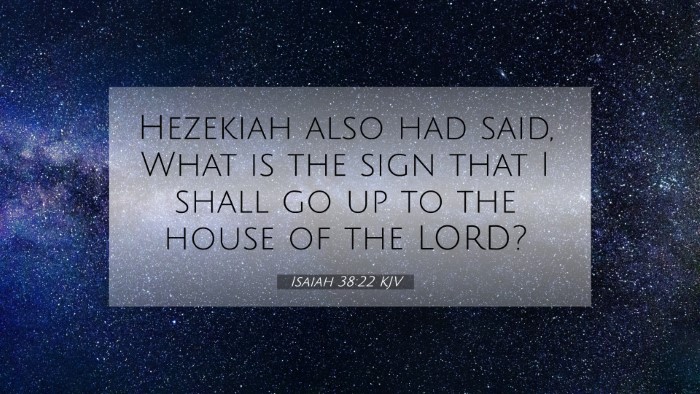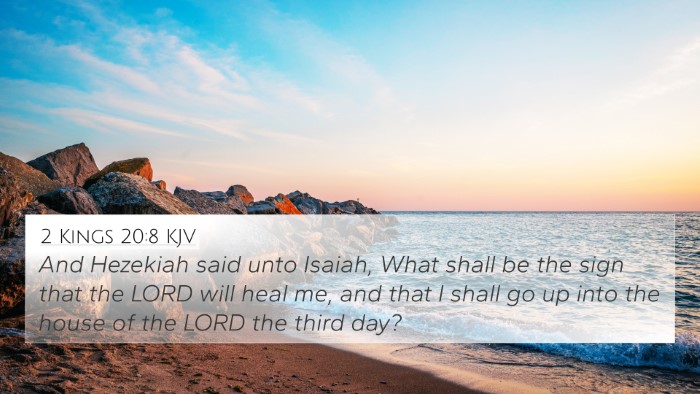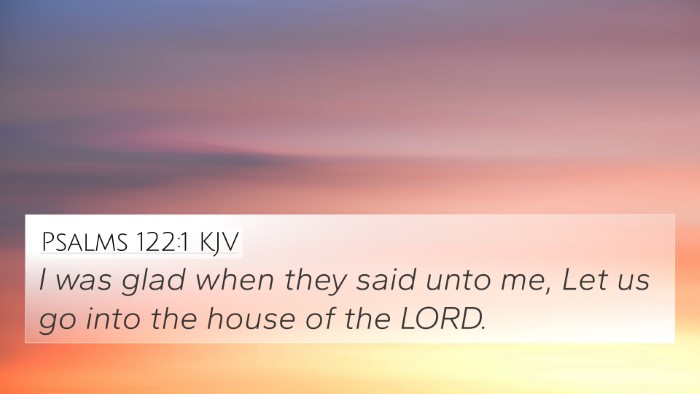Understanding Isaiah 38:22
Isaiah 38:22 states: "Hezekiah also had said, What is the sign that I shall go up to the house of the Lord?" This verse comes at a pivotal moment in the narrative regarding King Hezekiah's illness and subsequent healing.
Summary of Isaiah 38:22
This verse highlights Hezekiah's desire for confirmation from God regarding his restoration and return to worship at the temple. His inquiry reflects a deep faith, seeking reassurance of God’s promise. It emphasizes the importance of signs in faith and the human need for divine assurance.
Insights from Public Domain Commentaries
-
Matthew Henry's Commentary:
Henry elaborates on Hezekiah’s situation, noting that despite his miraculous healing, he sought a sign from the Lord. This signifies a humble acknowledgment of his dependence on God’s confirmation, illustrating a relationship where faith and doubt coexist. He highlights the importance of worship and the fulfillment of vows, pointing to the temple as the central place of worship.
-
Albert Barnes' Notes:
Barnes discusses the significance of Hezekiah's query as a request for divine assurance. He notes that in biblical times, signs and wonders were a common way for God to authenticate His promises to His people. The inquiry reflects a yearning for divine fellowship and worship after deliverance, suggesting spiritual restoration.
-
Adam Clarke's Commentary:
Clarke interprets Hezekiah’s question as a sign of both his faith and uncertainty. For Clarke, the request for a sign demonstrates a thoughtful and discerning Faith. Clarke emphasizes the connection between physical healing and spiritual renewal, explaining how Hezekiah’s experience serves as a model for believers seeking confirmation of God’s promises.
Cross-References and Connections
Isaiah 38:22 has several related verses that can be used for deeper biblical study and understanding. These Bible verse connections exemplify themes of healing, divine promises, and the importance of worship:
- 2 Kings 20:1-11 - This passage narrates the same event of Hezekiah’s sickness and God's promise of healing, shedding light on the context of Isaiah 38:22.
- Isaiah 7:11 - The demand for a sign is a recurrent theme in Isaiah, where the Lord offers signs to affirm His word to His people.
- Matthew 12:38-40 - This New Testament reference reflects on seeking signs, tying back to the importance of faith without reliance on visible proofs.
- John 14:14 - Jesus speaks of the power of asking in His name, encouraging believers to seek assurance in their requests to God.
- James 1:5 - A relevant verse where it encourages asking God for wisdom, correlating with Hezekiah’s inquiry for a sign as a wise approach to divine promises.
- Isaiah 66:23 - It emphasizes worship and observing the Lord, affirming the desire to return to the house of the Lord as expressed by Hezekiah.
- Psalm 119:34 - This verse speaks of understanding God’s law and is indicative of Hezekiah’s pursuit of understanding through signs.
- Luke 1:18-20 - Zechariah’s response to the angel emphasizes the theme of seeking signs from the Lord regarding promises of God.
- Romans 4:20 - The faith of Abraham mirrors Hezekiah’s request, showcasing steadfast faith amid uncertainty.
- Exodus 3:12 - God gives a sign to Moses about his mission, echoing the notion that divine assurance accompanies God’s call.
Drawing Connections through Cross-Referencing
Cross-referencing Biblical texts is essential for understanding the inter-biblical dialogue and thematic connections. The inquiry of Hezekiah can be linked to broader themes of divine interaction with humanity, especially around healing and restoration. As noted, tools for Bible cross-referencing such as a Bible concordance or cross-reference guide enable deeper comparative Bible verse analysis.
This method not only enhances one’s comprehension of specific passages but also illuminates the connections between Old and New Testament scriptures. By utilizing these Bible reference resources, individuals can uncover hidden parallels and thematic consistency across the Biblical narrative.
Practical Applications
For those engaging in cross-referencing Bible study, here are some tips:
- Use a Bible concordance: This tool can help you find cross-references quickly.
- Compare translations: Different translations can shed light on specific phrases and meanings.
- Study in context: Always consider the surrounding verses to understand the wider message.
- Integrate thematic studies: Look for themes like healing, faith, and divine assurance across the Bible.
- Group studies: Discussing passages with others can uncover diverse insights and applications.
- Utilize digital resources: Many online platforms offer comprehensive Bible cross-reference materials.
Conclusion
Isaiah 38:22 serves as a profound reminder of the relational aspect of faith, emphasizing the importance of seeking signs and assurance from God. Through careful examination of this verse alongside its cross-references, believers can deepen their understanding of God's nature and His promises to those who seek Him earnestly. Engaging with biblical texts in this manner not only enriches individual faith experiences but also fosters a greater grasp of the unified story of Scripture.









